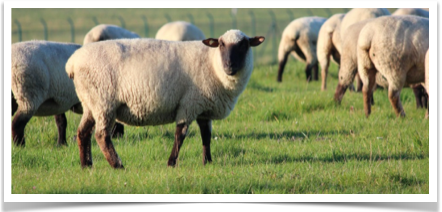羊の群れが犯人逮捕

Flock of Sheep slow
Flock of Sheep fast

| 日本語 | English | ひらがな |
|---|---|---|
| 羊の群れが犯人逮捕 | Criminal Gets Busted by a Flock of Sheep | ひつじ の むれ が はんにん たいほ |
| 各国のニュースでは | in the news in every country | かっこく の ニュース では |
| 警察と犯人のカーチェイスの場面を見る | one sees the car chases of police and criminals | けさつ と はんにん の カーチェイス の ばめん を みる |
| 犯人の車が警察の車数台に確保されたり | the criminal’s car is cordoned off by several cars of the police | はんにん の くるま が けいさつ の くるま すうだい に かくほ されたり |
| 逃走中の車がハンドルを上手くきれず | during the escape (the criminal) unable to steer the car well | とうそうちゅう の くるま が ハンドル を うまく きれず |
| 電柱や建物に突撃し | crashes into a utility pole or a building | でんちゅう や たてもの に とつげき し |
| 犯人が逮捕されたりする光景をみます | one sees a scene where the criminal is arrested etc. | はんにん が たいほ されたりする こうけい を みます |
| 先日 | the other day | せんじつ |
| 人間より羊が多いニュージーランド | in New Zealand where there are more sheep than people | にんげん より ひつじ が おおい ニュージーランド |
| カーチェイスが繰り広げられました | a car chase unfolded | カーチェイス が くりひろげられました |
| 犯人逮捕に一役買った | played a role in the arrest of a criminal | はんにん たいほ に ひとやく かった |
| なんと羊の群れでした | was what…!, a flock of sheep | なんと ひつじ の むれ でした |
| 1時間半以上逃げ続けた犯人 | the criminal who had been on the run for more than an hour and a half | 1じかんはん いじょう にげつづけた はんいん |
| 150匹の羊の群れに道を塞がれてしまい | the road had ended up blocked by a flock of 150 sheep | 150ぴき の ひつじ の むれ に みち を ふさがれて しまい |
| 身動きが取れず | unable to move | みうごき が とれず |
| 逮捕されてしまいました | (the criminal) ended up being arrested | たいほ されて しまいました |
in the news in every country かっこく の ニュース では
one sees the car chases of police and criminals けさつ と はんにん の カーチェイス の ばめん を みる
the criminal’s car is cordoned off by several cars of the police はんにん の くるま が けいさつ の くるま すうだい に かくほ されたり
during the escape (the criminal) unable to steer the car well とうそうちゅう の くるま が ハンドル を うまく きれず
crashes into a utility pole or a building でんちゅう や たてもの に とつげき し
one sees a scene where the criminal is arrested etc. はんにん が たいほ されたりする こうけい を みます
the other day せんじつ
in New Zealand where there are more sheep than people にんげん より ひつじ が おおい ニュージーランド
a car chase unfolded カーチェイス が くりひろげられました
played a role in the arrest of a criminal はんにん たいほ に ひとやく かった
was what…!, a flock of sheep なんと ひつじ の むれ でした
the criminal who had been on the run for more than an hour and a half 1じかんはん いじょう にげつづけた はんいん
the road had ended up blocked by a flock of 150 sheep 150ぴき の ひつじ の むれ に みち を ふさがれて しまい
unable to move みうごき が とれず
(the criminal) ended up being arrested たいほ されて しまいました

Thank you for the article. By the way, the fast video doesn’t seem to be working.
Thanks for telling me. I just fixed it. Sorry it took so long. I have been very busy at my real job lately.
No worries! Thanks for fixing it. 🙂
Hi Sakura,
It seems it still isn’t working…
The others do though.
I think I got it this time.
Yep! Thank you! 🙂
There is a small mistake in the “fast” audio track: instead of 人間より羊が多い it is read as 日本より羊が多い (although that is probably also true :).
Thanks a lot for pointing that out. I am off from work today, so I will have time to fix it.
Thanks for yet another helpful article, as always I have picked up some very useful language here. I was wondering if I could ask a quick grammar question. With the sentence`150匹の羊の群れに道を塞がれてしまい`, if I understand correctly, `塞がれる` is the passive form of `塞ぐ`. If that is the case, shouldn`t it be 道が、not 道を? Any explanation you could offer on that would be great.
(also, in the first paragraph, 突撃 is written, should that not be 衝撃?)
Thanks for you question. In this case, the subject is not 道, but rather 犯人. As for 突撃,
the kanji is correct. I had mistakenly inserted the wrong furigana, which I have corrected.
Sometimes, it is hard to see these mistakes mixed in with HTML code. I really appreciate your
sharp eye. Thanks so much!
Jack,
I thought I’d elaborate a little bit on Sakuraさん’s answer, since she was a bit brief.
If you translate the Japanese sentence back into English (“The road was blocked by a herd of 150 sheep”), yes, it seems that the word 道 should take the particle が instead of を.
However, there are two different ways passive verbs are used in Japanese. If you want to create a generic passive tense sentence, your particle usage would be correct.
(例)
田中:「坊ちゃん」と「こころ」、どの本が夏目漱石に書かれましたか?
石川:夏目が両方も書いたのです。
However, in Japanese the passive tense is often used to indicate someone received a negative action.
(例)
× 昨日の夜、私の家が落書きされたようです。
○ 昨日の夜、私が家を落書きされたようです。
× 今朝、通勤電車で僕の足が踏まれた。
○ 今朝、通勤電車で僕は足を踏まれた。
Translated back into natural English, we would generally say “My house got graffitied” or “My foot got stepped on,” and thus it seems the 主語 should be “house” or “foot.”
It may help to think of it in these terms: Not “the road was blocked,” but “the criminal got his road blocked.” Not “My house got graffitied,” but “I had my house graffitied (unfortunately).” Not “My foot got stepped on,” but “I got my foot stepped on (unfortunately).” This may help make the distinction a little clearer.